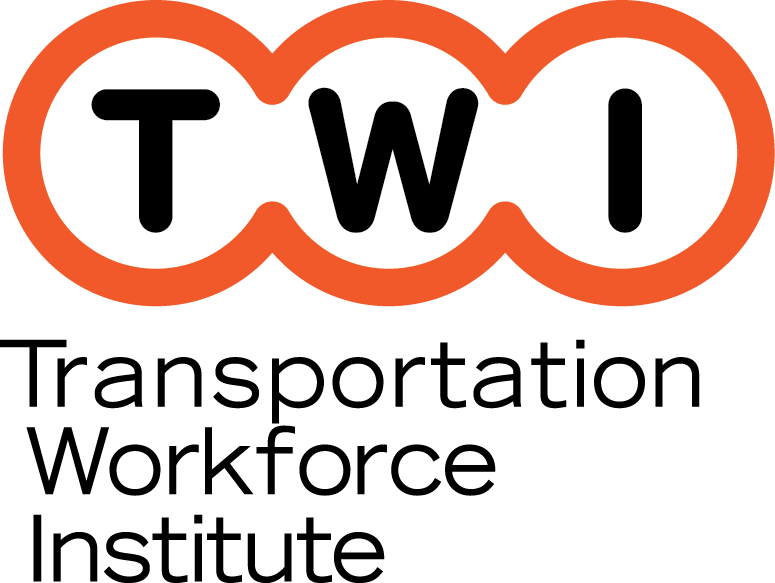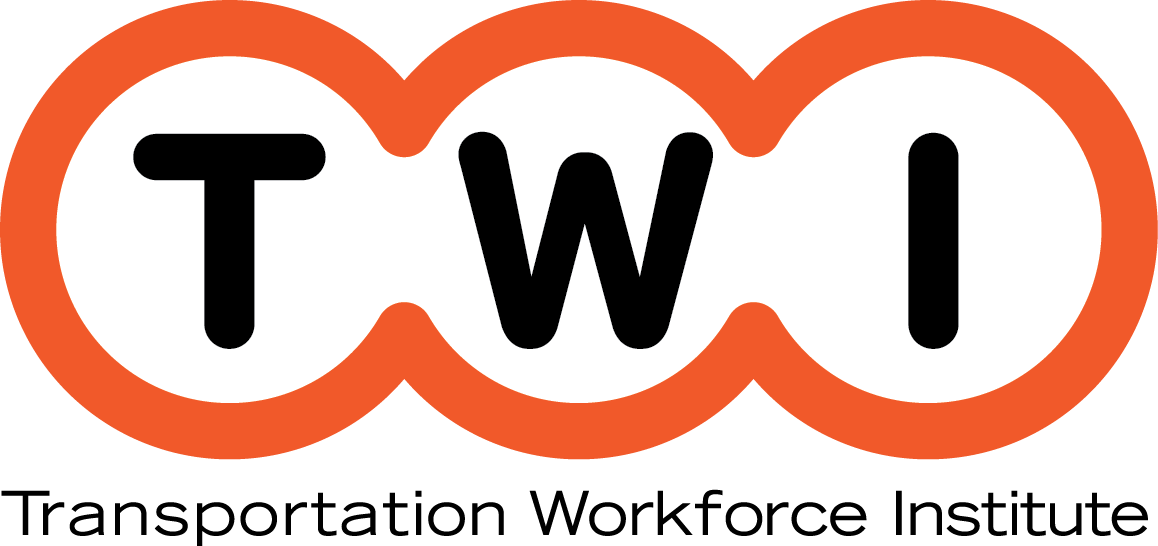Driving Innovation
Transportation workforce institute
The Transportation Workforce Institute (TWI) aims to ensure a well-trained and diverse transportation workforce. TWI’s reach is national–constructing and disseminating model, sharable curriculum and workforce development resources based on national industry standards and certifications. impact is regional–leading industry, education, and workforce development partners in creating programs and services that meet immediate and long-term employer needs while connecting diverse communities and citizens through transportation projects and workforce development efforts.
Our work is shaped by three inter-connected strategies: (1) contribute to a systemic approach to workforce development in the U.S. transportation industry (2) enable agile and interlinked responses to regional employer demands, and (3) revitalize communities and connect citizens through transportation initiatives and activities.

Misson
Ensure the Transportation industry has the requisite, skilled workforce to keep America’s people and goods moving.
Overview
Transportation Workforce Institute (TWI), established in 2015 with seed funding from a Federal Transit Administration (FTA) Innovative Public Transportation Workforce Development grant, is hosted by Los Angeles Trade-Technical College and the first of its kind to be led by a community college in the US. Los Angeles Trade-Technical College has a 90-year history of providing workforce training and transfer opportunities and serves over 23,000 students annually from the greater Los Angeles region. TWI and the college are located at the epicenter of substantial transit activity, with over 40 rail and bus lines serving the region.

TWI’s purpose is to ensure a well-trained and diverse transportation workforce. TWI’s reach is national; constructing and disseminating model, sharable curriculum and workforce development resources based on national industry standards and certifications. TWI’s impact is regional; leading industry, education, and workforce development partners in creating programs and services that meet immediate and long-term employer needs while connecting diverse communities and citizens through transportation projects and workforce development efforts.
Need
There is substantial demand for new and replacement positions as the industry is experiencing new job growth rates in the double digits and anticipates a significant number of retirements from its aging workforce, where nearly half of the workforce will be eligible to retire within the next 10 years.  The expansion and evolution of intelligent transportation technologies means existing employees and workforce development practitioners continuously need training to develop new skill sets. And there is demand for a workforce that mirrors the growing ethnic diversification in the U.S., particularly in each community the industry operates within. Thus, the industry needs more qualified workers and successful models of pre-employment and incumbent worker education that maximizes participation of diverse populations, ensures employment readiness of new entrants, and promotes the retention and new skilling of existing workers once hired.
The expansion and evolution of intelligent transportation technologies means existing employees and workforce development practitioners continuously need training to develop new skill sets. And there is demand for a workforce that mirrors the growing ethnic diversification in the U.S., particularly in each community the industry operates within. Thus, the industry needs more qualified workers and successful models of pre-employment and incumbent worker education that maximizes participation of diverse populations, ensures employment readiness of new entrants, and promotes the retention and new skilling of existing workers once hired.

Key Strategies
Systematic Approach
- Contribute to a systemic approach to workforce development in the U.S. transportation industry by:
- Translating national standards and certifications into model competency-based curriculum
- Constructing and disseminating sharable, workforce development resources
Agile Response
- Enable agile and interlinked responses to regional employer demands by:
- Convening regional employers; workforce-, economic-, and community-development partners to identify, develop and implement action plans to address immediate and projected transportation workforce needs
- Creating education programs for emerging, high-growth, and hard-to-fill occupations
- Implementing interlinked K16, adult education, and apprenticeship pathways
- Brokering programs and services to address employer workforce development priorities
- Defining performance measures and assessing program and service quality and graduate competence
Revitalize Communities
- Revitalize communities and connect citizens through transportation initiatives and activities by:
- Serving as an intermediary for regional and state transportation projects
- Outreaching and recruiting citizens into workforce development programs; ensuring the transportation workforce represents the community it serves
- Building gateway programs incuding pre-education and pre-employment preparation, supportive services, and work-based learning experiences; to increase education and employment success
Get In Touch
(213) 763-3997
Mailing Address
400 West Washington Blvd
Room B1-227
Los Angeles, CA 90015
twi@lattc.edu
GPS Navigation
2198 S. Flower St
Los Angeles, CA 90015
This is the address of the entrance to our rooftop parking lot. Turn left onto the ramp at 22nd street. For the TWI Office, proceed to B1-227 (one flight down near the elevator)

Non-Discrimination Statement
Los Angeles Trade-Technical College does not discriminate in the educational programs or activities it conducts on the basis of any status protected by applicable state or federal law, including, but not limited to race, color, ethnicity, national origin, sex/gender, gender identity/expression, pregnancy, sexual orientation, age, religion, mental or physical disability, medical condition, or veteran status. For additional information, please contact the LACCD Office for Diversity, Equity, and Inclusion; (213) 891-2315; Diversity-Programs@email.laccd.edu or TitleIX@email.laccd.edu
